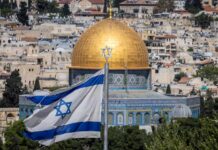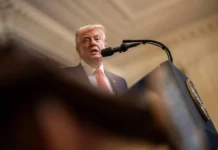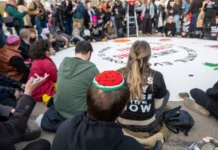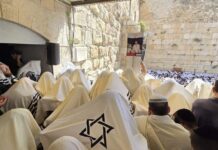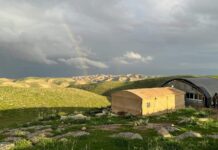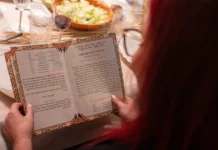Moses stood up to the Egyptian slavemaster and then to Pharaoh for the freedom of his people, and with specific guidance from God, brought them through the desert to the Promised Land—today’s land of Israel, including Judea and Samaria.
In Exodus, we see this journey, including the words of God to the Jewish people, and their commitment to a way of being received at Sinai. In the Torah, we are even given words for the future, of how we must protect the land given to us by God. And so, as we are in the Passover season, we must celebrate our Jewish community in the State of Israel and in the Diaspora, and renew our vision of who we are.
Basic fact: The two-state solution is dead, killed by Israel’s Palestinian Arab enemies who refuse to acknowledge Israel’s right to exist in peace and security. This same Palestinian leadership treats its people without the human dignity we cherish for all. Without sovereignty over Judea and Samaria, and with the mountains of the Jordan Valley under the control of our enemies, the security of Israel would be compromised.
Hillel’s most famous saying is: “If not for myself, who is for me? And if I am only for myself, what am I? And if not now, when?” I look at that as an individual Jew and a member of the Jewish people, for both have validity and total relevance for a future Israel. Whereas “social justice” is the easy definition for an American Jew to define tikkun olam, as to Israel, we may need to adopt an earlier sense of these words, for as a Jewish state, it remains on the frontlines in a difficult neighborhood.
The early meaning of tikkun olam, before a diversion in the 19th century, appears to come from the “Aleinu” prayer, composed around the third century in Babylonia, according to noted author Mitchell James Kaplan. It referred to “fixing the world under God’s sovereignty,” which, in a later mystical expansion, depended on man’s actions as a gathering of Divine sparks. God directed Jews into Judea and Samaria with the direct intention that it should be the home for the Jewish people. We must have faith in those words, for we are protecting that land for ourselves and for our Christian brethren, whose liturgy is based on that heritage. We had Jewish kingdoms on that land; it must not be taken away by our enemies.
Israel has been in a battle for its very existence. I often look back to the last time the Jews governed Israel, 2,000 years, when at that time, there were two kingdoms: Judea and Israel. Our ancestors never gave up the dream of return and redemption throughout those two millennia, living in Diaspora and creating a magnificent path of history.
We stood for a set of principles grounded in the lessons of Torah. We found new ways of thinking with breakthroughs in human dynamics and values. We have been active on the front row of thinking and achieving in all societies where we have lived.
Now, we face a conundrum both in the Israeli and American Jewish communities, where significant sectors have moved away from observant Judaism to a religiosity that hangs on the phrase tikkun olam, defining it to the greatest extent as “repairing the world” or “social justice.” We have stood shoulder to shoulder with other communities demanding their rights for a better society, and, disappointingly, have found less reciprocity at a time of need from our Jewish community.
We must have unity in our community, for our future is at stake. We must become warriors and not depend on victimhood. Notwithstanding the reality of a rise in global antisemitism, many incidents cited by our guardian agencies are no more than unpleasantries, and we would be best to recognize them as such. We must not be afraid. Let’s erase words and pictures from the wall, and when confronted with unacceptable taunts, shout them down with the words of victory, perhaps simply: Dayenu. “Enough!”
Justice reigns when our community fights attacks with the strength of individual intent. Lawfare and security have become the frontline words of our people in America, but I don’t see that as tikkun olam. In fact, it is mind-boggling to me that most U.S. Jews don’t see that a declaration of sovereignty over Judea and Samaria—a return after 2,000 years of being in the desert—is justice for our people, safeguarding our heritage and bringing more light into the world.
It is outrageous and unacceptable to see organizers of anti-Israel rallies, led by members of our Jewish community and others who consider themselves leaders of our community, finding fault at every turn with Israel. And yet, we have been fortunate to have a U.S. government that is more supportive of Israel than at any time we can remember, and new young influencers stepping forward to speak out for us. Traitors to our Jewish future need to be re-educated on the meaning of tikkun olam as it applies to Israel and, due to their raw ideological hatred, to stop criticizing leaders who support us.
The fight in Israel is on seven fronts, and the eighth, unfortunately, is in the Diaspora, where too many of our people parade around in the guise of being pro-Israel, condemning so much of a society that protects the Jewish future.
Our first responsibility is to that future. We must not forsake the words of one of our greatest sages, Hillel, for we will have lost our way. Then I would reflect, “Who are we, and where are we?” We must be bold and steadfast, and in the original words of our people, proudly say, “Here I Am,” for we will know Israel’s future mandates sovereignty over Judea and Samaria, and we will have carried that torch for our generation.

